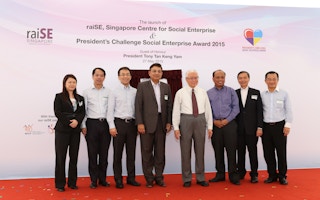A new centre has been set up to groom and nurture social enterprises in Singapore – a sector that has seen rapid growth in the city-state in recent years.
The Singapore Centre for Social Enterprise, or raiSE, was launched on Wednesday as a one-stop place for social enterprises to seek funding, find opportunities to collaborate with other organisations, and gain access to other forms of support such as mentoring.
raiSE has the backing of four organisations: Ministry of Social and Family Development (MSF), National Council of Social Service, Social Enterprise Association and Tote Board.
It has secured S$30 million from the MSF and the Tote Board to help the sector grow over the next five years.
A social enterprise is a business or company whose primary purpose is advancing social, environmental and human rights causes.
In Singapore, restaurants such as Eighteen Chefs and Blisse which give former convicts employment and a second shot at life by imparting them skills, are examples of such enterprises.
“
We have made significant progress as a country. How advanced a society is should not be measured by just its GDP but by how it helps the less fortunate among us. Social enterprises take the proverbial approach of ‘teaching how to fish’ as opposed to ‘handing over the next’,” he added.
Tony Tan, President of Singapore
“Social enterprises are an important part of the broader system to address social gaps and needs in our community. It is for this reason that raiSE was set up with support from the people, private and public sectors,” Gautam Banerjee, chairman of raiSE and nominated Member of Parliament, said.
The new centre aims to help social enterprises be sustainable and achieve their social goals at the same time, he added.
“We also want to do this in collaboration with partners who want to raise the bar for social enterprises in Singapore. So we welcome corporations and supporters to work with us,” Banerjee said.
Other sponsors such as property developer City Developments and Singapore Pools have agreed to provide shared office spaces for startups at Republic Plaza in the central business district and at Holland Drive, respectively.
raiSE was formed out of the Social Enterprise Association, which had about 300 members as at the end of 2014, having grown from 100 when it was first set up in 2009. These companies will now become members of the new centre.
There’s some good work done by the SE Association, and we want to take it a notch higher,” said Alfie Othman, executive director of the Association who has assumed the same role at the new raiSE.
Despite this growth, many social enterprises still face challenges such as difficulties in finding talent, funding and building business know-how, said Singapore’s President Tony Tan at the launch of raiSE at its new office at Launchpad@one-north.
“A strong, concerted effort involving multiple stakeholders in the community is needed to nurture and grow the sector,” Tan said.
“We have made significant progress as a country. How advanced a society is should not be measured by just its GDP but by how it helps the less fortunate among us. Social enterprises take the proverbial approach of ‘teaching how to fish’ as opposed to ‘handing over the next’,” he added.
Tan also launched the President’s Challenge Social Enterprise Award 2015, an award conferred by the President’s Office to recognise outstanding social enterprises for their contributions to the local community. The prize was first conferred in 2012
The Social Enterprise of the Year will win S$50,000 in cash; the Social Start-up of the Year S$40,000 and the Youth Social Enterprise of the Year will take home S$25,000.

















